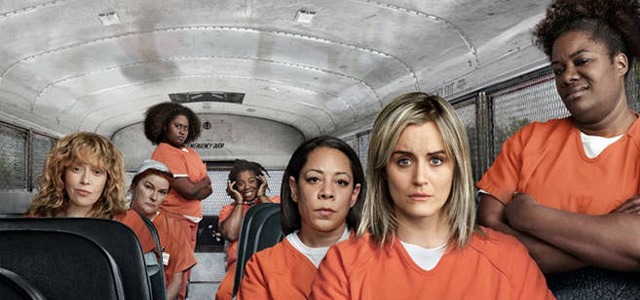Review: Orange is the New Black Season Seven
Starring: Taylor Schilling, Kate Mulgrew, Uzo Aduba, Danielle Brooks, Dascha Polanco
Even if you fell off during the show’s mid-run quality dip, the end of Orange is the New Black is a significant event. The show, which was ultimately set between two different women’s prisons across its run, has been a critical darling and one of Netflix’s early major success stories, as far as its original programming goes. Here was a show that, while nominally a comedy, had plenty to say about modern America, and a cast predominantly made up of women, most of them not white.
For a few years, Netflix seemed reticent to cancel its programs, and it felt that the streaming service would be the ideal place for shows like Orange is the New Black – shows that would highlight voices and perspectives that often weren’t featured on traditional television.
The end of Orange is the New Black, though, also feels like the end of a phase in Netflix’s development. Shortly before the final season of the show aired, Netflix cancelled Lisa Hanawalt’s extraordinary animated sitcom Tuca & Bertie, a show that, similarly, explored serious issues in a funny way, and stood as a rare example of an adult animated show that was created by a woman and featured a mostly non-white cast. Similarly, the beloved One Day At A Time recently had to seek a home outside of Netflix, despite critical acclaim. Recent reports and trends suggest that Netflix is likely to cut more shows, no matter their importance, and it’s hard to imagine getting seven seasons of a show like Orange is the New Black again.
Perhaps understanding the significance of having made it this far, creator Jenji Kohan and her writing staff have used the final season to swing hard against every target in their orbit. The inherent inhumanity of prison; the gross corporatisation that favours profit margins over inmate health; the internal corruption and weak background checking procedures that put awful people in charge; the evils of the private prison system; the roadblocks we put in front of ex-convicts that make genuine reform on the outside difficult.
More than anything, though, season seven’s main enemy is ICE and the way it treats its detainees. At the end of season 6, Blanca was picked up by ICE immediately after her early release; much of the seventh season is focused on her experiences within an ICE-run detention centre and the fight for her freedom to return to America, as well as the situations faced by the other women there.
The show makes its stance clear – the detention centres run by ICE are inhumane to the point of being evil. It’s a system designed with failure in mind, and the show makes it very clear that it’s on the side of refugees, who are degraded and dehumanised by their captors. It’s hard to watch without getting furious at way these refugees are treated (especially since, in Australia, we have arguably an even more horrifying humanitarian crisis to confront).
This is the strongest season of Orange is the New Black since at least season four because it’s unflinching in its examination of the corrupt systems and underlying social dynamics that fuel the American prison epidemic. The show twists the knife hard and often, but it does so to highlight the conditions that make it very difficult for women who have suffered within an unjust society to find any sort of success. It’s brutal, but that brutality is fully earned. Some characters do get happy endings, but plenty of others don’t – for all of the show’s occasional whimsy, it wisely ensues wish fulfillment in favour of something that feels much closer to reality in this final season.
It’s also worth celebrating, one last time, one of the greatest casts ever assembled for a television show. Uzo Aduba’s Suzanne remains the standout performance – and one of the best on television – while Danielle Brooks plays Taystee’s complex path through the final 13 episodes perfectly. Even Nick Sandow’s Joe Caputo is given a satisfying arc as a flawed figure who proves himself to not be beyond redemption.
There are a few niggling issues. The timeline, for instance, stopped making sense years ago, with Piper’s initial 2013 sentence of 15 months not gelling with the show’s reactive nature as it comments the real world as though Piper was in prison for six years. Sometimes the comedy and drama mix together like oil and water, and you’ll wish that the show had skipped a joke to allow a sincere beat to land harder. It’s also difficult, after seven seasons, to keep track of every interpersonal relationship on the show, which makes some plots harder to follow than others.
But overall, Orange is the New Black’s final season is important not just for its quality, but as a reminder of what a show can do when it focuses on voices we don’t get to hear often, stories we’ve not seen before, and problems in our world, and in ourselves, that we need to confront. It’s a reminder of why Netflix’s original programming slate has been – and still could be – an important space for work like this. As Regina Spektor urges in the opening song, remember all their faces. Remember all their voices.
Season seven of Orange is the New Black is now streaming on Netflix.
James O’Connor is a freelance writer and critic.













